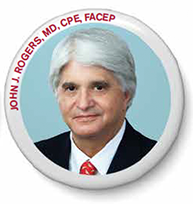
In July, I attended a corporate advisory council meeting hosted by ACEP. I have participated in these meetings in the past, but this one was different. The overriding theme from companies providing goods and services to emergency physicians was a desire to make products that will improve care and allow us to work smarter. I will enable industry to work with emergency physicians to develop these strategies so that we stop wasting our time performing pointless, repetitive actions in order to do our job.
Explore This Issue
ACEP Now: Vol 35 – No 08 – August 2016These initiatives are only just the beginning. For us to successfully incorporate CEDR, EDIE, and IT solutions into our practice at the national level, ACEP will need unwavering presidential support.
Implementation of CEDR, EDIE, and IT support will be my signature issue.
“Imagine having access to national-level practice- improvement data that can be used to satisfy pay-for- performance requirements for reimbursement but also can be used to improve quality of care and outcomes.” —Robert E. O’Connor, MD, MPH, FACEP
 John J. Rogers, MD, CPE, FACEP (Georgia)
John J. Rogers, MD, CPE, FACEP (Georgia)
Current Professional Positions: co-emergency department medical director, Coliseum Northside Hospital; staff ED physician, multiple locations throughout Georgia
Internships and Residency: internship, Department of Surgery, University of Iowa; residency, Department of Surgery, Medical Center of Central Georgia (now Mercer University)
Medical Degree: MD, University of Iowa (1978)
Candidate Question Response:
Our major challenge is also our major opportunity: to ensure that the health care reforms embedded in the Affordable Care Act are implemented in a manner that supports our ability to deliver emergency care while at the same time improves rather than impedes our work life. As MACRA (the Medicare Access and CHIP Reauthorization Act of 2015) matures, we must provide the strategies that tie quality and payment in a rational manner. Quality measures must be meaningful, improve outcomes, be aligned with facility measures, and must not be implemented prematurely nor in a fashion that’s so complex or costly that it punishes small groups. MIPS (the Merit-Based Incentive Payment System) requires streamlining; we must understand how we can function in an alternative payment model and ensure the financial risks are appropriate.
Another challenge is President Obama’s budget proposal that requires all hospital-based physicians to accept in-network payment and prohibits balance billing. We must not passively acquiesce to becoming indentured servants who serve at the whims of the insurance industry. We must also be prepared to intelligently discuss the idea of offering a public option that many see as a precursor to a single-payer system.
Pages: 1 2 3 4 5 | Single Page





No Responses to “ACEP 2016 President-Elect Candidates Weigh In on Major Challenges, Issues Facing the College, Emergency Medicine”